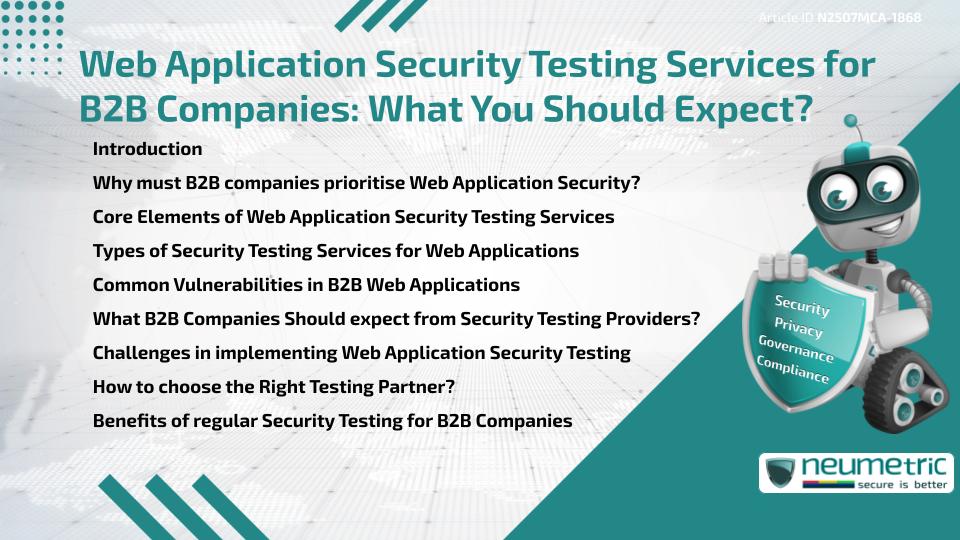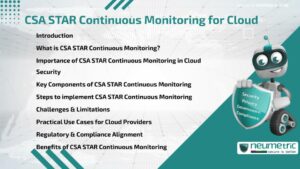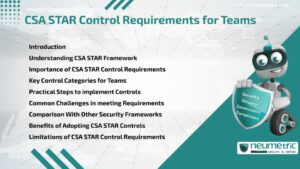Table of Contents
ToggleIntroduction
Web applications are the backbone of modern B2B operations. From Customer portals to internal tools, they handle Sensitive Data & transactions. However, with growing digital Threats, B2B firms can no longer afford to overlook security testing. Web Application security testing services for B2B companies are essential for identifying Vulnerabilities & ensuring that digital assets remain protected. This article explores what B2B companies should expect from these services, key components of testing & How to choose the right service provider.
Why must B2B companies prioritise Web Application Security?
Unlike consumer apps, B2B web applications often deal with high – value transactions, sensitive business data & multi – level access systems. A single security lapse can lead to data breaches, loss of Client trust or even regulatory penalties. According to OWASP, some of the most common Threats to web applications include injection attacks, broken authentication & Sensitive Data exposure.
In B2B ecosystems, these Threats are amplified due to integration with external Vendors & enterprise systems. Regular & comprehensive security testing is not just advisable — it is critical.
Core Elements of Web Application Security Testing Services
Web Application security testing services for B2B companies typically include a mix of manual & automated testing. These services focus on identifying known Vulnerabilities listed in frameworks such as the OWASP Top 10 & unknown weaknesses specific to the application’s logic & architecture.
Here are the main components to expect:
- Threat Modelling: Mapping Potential Threats against application functions.
- Static Analysis: Evaluating code without executing it.
- Dynamic Analysis: Testing the application during runtime to detect security flaws.
- Configuration Review: Assessing server, Framework & deployment configurations.
- Remediation Support: Guidance on fixing discovered Vulnerabilities.
Types of Security Testing Services for Web Applications
Web Application security testing services for B2B companies are often divided into several types, each offering a different level of protection:
- Black Box Testing: Simulates an external attack without prior knowledge of the system.
- White Box Testing: Full visibility into code & architecture for in – depth analysis.
- Grey Box Testing: A hybrid approach where partial information is shared to simulate an insider Threat.
- Penetration Testing: Focuses on exploiting Vulnerabilities to understand real – world impact.
- Vulnerability Assessment: Identifies & categorises weaknesses but does not exploit them.
Each type brings unique value depending on the security maturity of the business.
Common Vulnerabilities in B2B Web Applications
Several Vulnerabilities frequently emerge in B2B platforms. These include:
- Cross – Site Scripting [XSS]
- SQL Injection
- Broken Access Control
- Security Misconfiguration
- Insecure Deserialisation
These flaws can lead to unauthorised access, data leaks or complete takeover of the Web Application. The MITRE ATT&CK knowledge base is a useful resource for understanding how attackers exploit these Vulnerabilities.
What B2B Companies Should expect from Security Testing Providers?
B2B companies should look for a structured, well – documented approach from testing providers. A high – quality service should include:
- Clear Scope Definition: Customised based on business needs.
- Comprehensive Reports: With Risk ratings, impact assessments & mitigation strategies.
- Testing Across Environments: Including development, staging & production.
- Regulatory Mapping: Assistance in aligning results with standards such as ISO 27001 or SOC 2.
- Post – Testing Support: Help in interpreting findings & prioritising fixes.
Most importantly, the process should be collaborative, with open communication & tailored Risk insights.
Challenges in implementing Web Application Security Testing
Despite its importance, implementing Web Application security testing services for B2B companies is not always smooth. Common roadblocks include:
- Lack of Internal Security Expertise
- Disruption to Development Timelines
- Difficulty in Prioritising Vulnerabilities
- Budget Constraints
Addressing these challenges requires planning, team alignment & often, external guidance. For agile teams, integrating testing into the development lifecycle using DevSecOps practices can help.
How to choose the Right Testing Partner?
Not all providers offer the same quality of service. When choosing a partner for Web Application security testing services for B2B companies, consider:
- Experience with B2B Applications
- Certifications: Such as CREST, OSCP or CEH.
- Customised Testing Strategies
- Tool Proficiency: Usage of tools like Burp Suite or OWASP ZAP.
- Client References & Reputation
A good provider will not only run tests but also educate your team & strengthen your security posture in the long term.
Benefits of regular Security Testing for B2B Companies
Routine testing brings numerous benefits beyond just Vulnerability identification:
- Improved Compliance Posture
- Reduced Risk of Data Breaches
- Increased Customer Confidence
- Stronger Vendor Trust
- Optimised Application Performance
It is also a sign of security maturity & business responsibility — both vital in high – stakes B2B relationships.
Takeaways
- Web Application security testing services for B2B companies are critical for Data Protection & Compliance.
- These services include Threat modelling, code analysis & dynamic testing.
- Businesses should expect thorough, actionable reporting & expert remediation support.
- Choosing the right provider involves evaluating experience, Certifications & methodology.
- Regular testing leads to long – term security benefits & Risk reduction.
FAQ
What makes Web Application security testing different for B2B companies?
B2B applications often deal with Sensitive Data, complex workflows & Third Party integrations, requiring more thorough & continuous testing.
How often should B2B companies conduct Web Application security testing?
Ideally, testing should be done at least once a year & after every major code update or infrastructure change.
Do security testing services also help with Compliance?
Yes, they can help companies align with Compliance Requirements such as ISO 27001, SOC 2 or GDPR by identifying & fixing gaps in application security.
Can internal teams perform Web Application security testing?
While possible, internal teams may lack the objectivity or expertise that external specialists bring, especially for complex or large – scale applications.
Are automated tools enough for B2B application testing?
Automated tools are helpful but insufficient on their own. Manual testing uncovers logic – based & context – specific Vulnerabilities that tools may miss.
What are signs of a reliable Web Application security testing provider?
Look for proven experience, strong Client references, relevant Certifications & clarity in methodology & reporting.
Is Penetration Testing part of security testing services?
Yes, it is often a core component aimed at simulating real – world attacks to measure the impact of discovered Vulnerabilities.
How long does a typical Web Application security test take?
The duration can range from one (1) week to three (3) weeks, depending on the application’s size, complexity & scope.
Do B2B companies need to test both frontend & backend systems?
Absolutely. Frontend testing checks for issues like input validation, while backend testing addresses database, API & server Vulnerabilities.
Need help?
Neumetric provides organisations the necessary help to achieve their Cybersecurity, Compliance, Governance, Privacy, Certifications & Pentesting goals.
Organisations & Businesses, specifically those which provide SaaS & AI Solutions, usually need a Cybersecurity Partner for meeting & maintaining the ongoing Security & Privacy needs & requirements of their Clients & Customers.
SOC 2, ISO 27001, ISO 42001, NIST, HIPAA, HECVAT, EU GDPR are some of the Frameworks that are served by Fusion – a centralised, automated, AI – enabled SaaS Solution created & managed by Neumetric.
Reach out to us!





